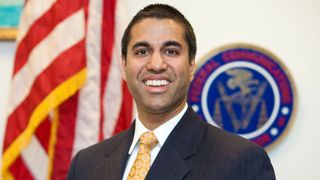Pai: FCC Will Vote to Tighten 5% Franchise Fee Cap

FCC chairman Ajit Pai has scheduled a vote at the August meeting on a Report and Order (R&O) to "prevent local authorities from unlawfully evading the 5% statutory cap on franchise fees," said Pai.
The FCC had sought comment on a Further Notice of Proposed Rulemaking (FNRPM) that sought input on whether the FCC should prohibit cable franchising authorities from regulating non-cable services and whether in-kind "exactions" as part of the price of securing a franchise should be counted toward the FCC's 5% cap on franchise fees, fees that total about $3 billion annually. Cable ops' answers were, not surprisingly, "yes" and "yes."
Pai signaled the FCC was, indeed, seconding those.
In the FNPRM, the FCC had tentatively concluded those should be the answers as well.
That came as part of the FCC's effort under Pai to take a new look at old rules and eliminate any that are outdated or perhaps never should have been on the books in the first place. It was also in response to a court remand of earlier conclusions that both the in-kind exactions and fees on non-cable services were out of bounds
In a blog post on the Aug. 1 meeting, Pai said the R&O would also "make clear that the Act does not allow franchising authorities to regulate most non-cable services offered by cable operators over their cable systems."
Pai calls them "common-sense rules that will enforce the legal framework Congress adopted decades ago," adding: "Excessive fees and inappropriate regulations imposed by local governments deter broadband deployment and discourage investment in next-generation facilities and services."
Broadcasting & Cable Newsletter
The smarter way to stay on top of broadcasting and cable industry. Sign up below
NCTA-the Internet & Television Association, has told the FCC that despite clear direction from Congress, local franchise authorities (LFAs) can't abuse the franchising process, that is what has been happening through excessive fees and in-kind "contributions," which include but are not limited to "courtesy equipment, I-Net construction, network capacity, channels, grants, sponsorships, specially created programming, local retail facilities, cash 'contributions,' free advertising," said NCTA.
Cable ops also say LFAs double tax them via separate franchise fees or rights-of-way fees on non-cable services offered on those already franchise-fee levied systems.
Given the stranded investment of built-out systems, cable ops lack power to refuse the LFA demands, NCTA told the FCC, if that means losing a franchise and thus not being able to recover those sunk costs.
The remand the FCC was also responding to was in Montgomery County, Md., v. FCC, in which the Sixth Circuit Court of Appeals found that the FCC could not use its mixed-use rule to bar LFAs from requiring franchisees to provide non-cable services because that would appear to prevent LFAs from regulating institutional networks, which the statute clearly allows them to do.
The court also concluded that the FCC had not sufficiently justified why it had expanded its definition of franchise fees to include non-cash requirements by LFAs and thus counted toward the 5% cap on franchise fees.
The court vacated those portions and remanded them back to the FCC for action, if necessary.
The FCC responded with the Sept. 25, 2018, FNPRM, telling the court that the "mixed-use network ruling should be applied to prohibit LFAs from using their video franchising authority to regulate non-cable services offered over cable systems by incumbent cable operators," which includes internet access services, and clarifying that they can still regulate institutional networks.
Contributing editor John Eggerton has been an editor and/or writer on media regulation, legislation and policy for over four decades, including covering the FCC, FTC, Congress, the major media trade associations, and the federal courts. In addition to Multichannel News and Broadcasting + Cable, his work has appeared in Radio World, TV Technology, TV Fax, This Week in Consumer Electronics, Variety and the Encyclopedia Britannica.

